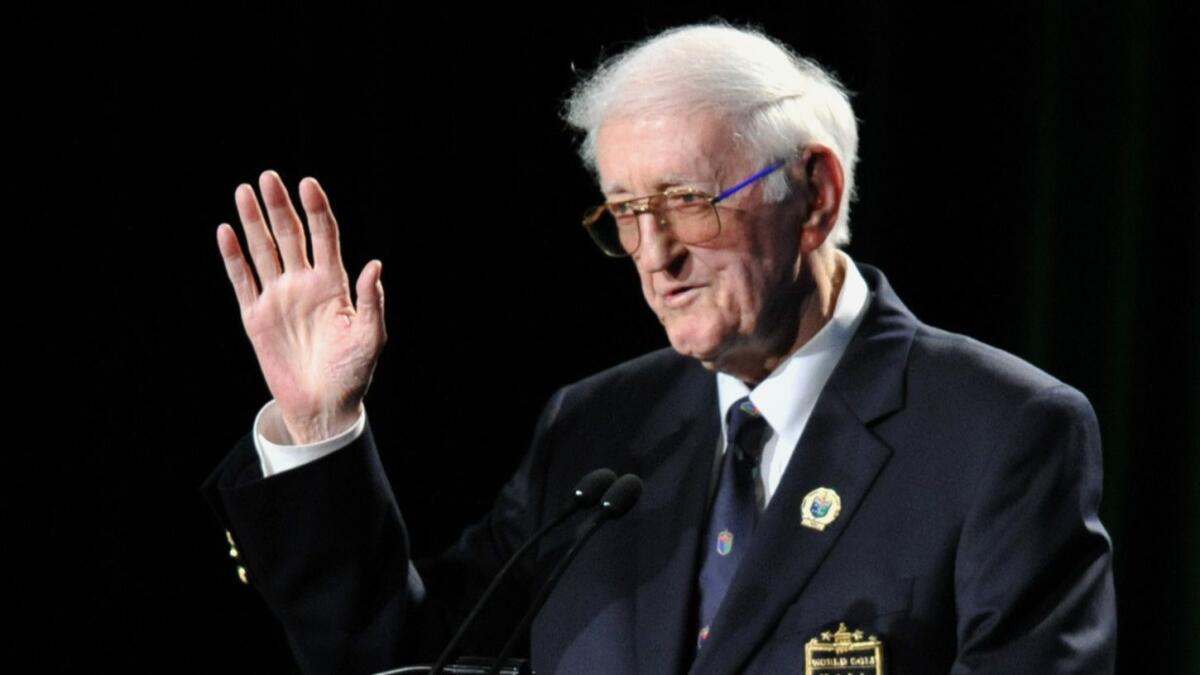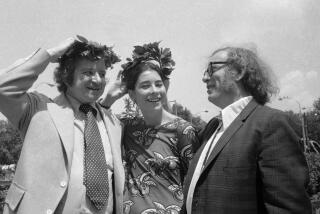Dan Jenkins, best-selling author who wrote ‘Semi-Tough,’ dies at 89

Dan Jenkins, the sportswriting great and best-selling author in a career that went from Ben Hogan to Tiger Woods and the manual typewriter to Twitter, has died. He was 89.
Texas Christian University athletic director Jeremiah Donati confirmed Jenkins died Thursday in his hometown of Fort Worth.
Jenkins started his writing career at the Fort Worth Press and rose to stardom at Sports Illustrated. He wrote best-sellers “Semi-Tough,” “Baja Oklahoma” and “Dead Solid Perfect” and was a columnist for Playboy and Golf Digest.
Jenkins played golf at TCU for his beloved hometown Horned Frogs and was a close friend of Hogan, also a Fort Worth native. A member of the World Golf Hall of Fame, Jenkins started covering the sport following Hogan and fellow Fort Worth star Byron Nelson.
“Being from Fort Worth, I would follow Ben Hogan and Byron Nelson anywhere,” Jenkins said on a 2011 conference call to announce his Hall of Fame selection. “Since they’re in there, I’m happy to be the third guy from Fort Worth so included.”
Jenkins covered his first major at the 1951 U.S. Open. Hogan shot 67 in the final round to win at Oakland Hills, and Jenkins still says that round on that “monster” of a golf course remains as good as he has seen anyone play.
“Oakland Hills looked more like a penitentiary than a golf course,” Jenkins said.
He listed that among his top three moments in golf, along with Jack Nicklaus winning his sixth Masters at age 46 and the 1960 U.S. Open, regarded by many as being one of the greatest days in the history of the championship. Arnold Palmer shot 65 in the final round to beat Hogan, the aging star, and Nicklaus, the emerging star who was still an amateur that day at Cherry Hills.
“I’d never experienced — even as an old, cynical writer — as much excitement as all of us felt that afternoon following that action,” Jenkins said. “There have been so many great moments in golf that you even forget some of them. But that one still stands out. There have been so many great tournaments that I’ve been privileged to see, and people paid me to go watch, that I’m awfully grateful for it.
“And I’m so happy that I chose the profession I did.”
His writing style was grounded in humor, and he often mocked the players he felt unworthy to win a major — starting with Jack Fleck, who took down his beloved Hogan in a playoff at Olympic Club for the 1955 U.S. Open, which remains one of the game’s biggest upsets.
Through all of his writings, though, Jenkins said he never tried to sell out accuracy for a good joke.
“Even though I was making a stab at humor, I don’t think I ever wrote a line I didn’t believe,” Jenkins said. “I tried not to draw too much blood. I tried to rave about all the heroes of the game, and they deserved it. When something great happens — like when an Arnold Palmer or Jack Nicklaus or Tiger Woods or Ben Hogan happens — you don’t have to be funny, you just have to be accurate.
“When you have to be funny is when you’re on deadline and somebody like Jack Fleck creeps up on you,” he said. “That’s when you have to tap dance, because it doesn’t make any sense. We have more and more of that these days, don’t we?”
Jenkins also is member of the Texas Golf Hall of Fame and the National Sportscasters and Sports Writers Hall of Fame.
When then-PGA Tour Commissioner Tim Finchem listed all of Jenkins’ achievements, including his numerous writing awards, Jenkins replied: “You left out my cure for polio.”
Jenkins is survived by wife June, sons Danny and Marty and daughter Sally, a columnist for the Washington Post.
More to Read
Get our high school sports newsletter
Prep Rally is devoted to the SoCal high school sports experience, bringing you scores, stories and a behind-the-scenes look at what makes prep sports so popular.
You may occasionally receive promotional content from the Los Angeles Times.






